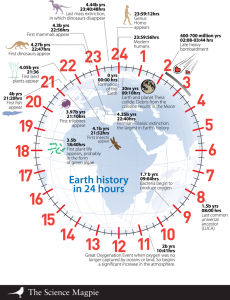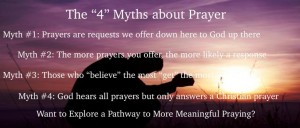 “What’s the point of human existence?”
“What’s the point of human existence?”
“Why did people actually show up on earth?”
“What is the point of human creation?”
“What is the point of YOUR life?”
These are big questions and not easily answered. Anyone who answers them quickly is only admitting they have not explored them deeply.
I was told as a child in Sunday School that God created the world and that humans were the crown of God’s creation. That of all the created things…the solar system, the stars and planets, the earth and all plants and animals…that, of all of God’s good creation, humans were the most important to the Creator and the crown of his creation.
Well, if that’s true, why did it take God so long to get around to creating humans…modern humans?
This universe, my friend, is more than 13 billion years old and modern humans showed up only about 250,000 years ago. Now, if you’d like to put that into perspective – and, frankly, you might not – give consideration to this disturbing notion that, on a geological time clock of 24-hours, what this means is that humans have only been around for the last few minutes in the great expanse of time.
Here’s how the Science Magazine depicts it:
Notice where modern humans appear.
Clearly, humans were hardly the point and purpose of creation. It is the ultimate ego-trip to imagine we are. Which makes the reading of our sacred literature so interesting to me. Scripture was written by humans who proudly depicted themselves as the crown of God’s creation. Go back and re-read Genesis 1 and 2, my friend, if you think I’m just making this up.
Read Genesis, however, from the perspective of humans writing about themselves. In other words, stop reading Genesis, or any part of the Bible for that matter, as a document dropped from heaven itself as if God himself wrote it and in the language of King James himself.
Not so. The Bible, as indeed all sacred literature, was written by humans who sought to make sense of their human experiences in light of their place in the world, a world much smaller than our understanding today. They thought of the world, for example, as a flat surface and that, to venture out too far, one might just fall off the edge into the pit below – what later generations thought of as the place of the dead, and even hell. The heavens above were just beyond the clouds. That was the abode of God. The stars they observed at night were like little lights on a ceiling of their house, the world.
They had no conception of the vastness of this universe. Which explains how they could write about the bodily ascension of Jesus, as Luke does in the Acts of the Apostles (Luke 1), and see no conflict whatsoever. Since heaven was just beyond the clouds, why it made perfect sense that Jesus disappeared on a cloud just out of their sight and into heaven on the other side of the cloud and took his seat at the right hand of God. You see, parenthetically, they even thought of God as a grand human who had hands, too.
We know today, however, that heaven — whatever people believe it to be and most still believe it to be an actual place in space and time — but, whatever it is, we know that it is not a place just above the clouds. In fact, we cannot imagine where it might be. Since we have a pretty good idea that heaven is not likely located on one of our planets in this solar system, then most Christians are inclined to say it must be somewhere beyond our Milky Way galaxy.
That sounds reasonable enough until you consider what my good friend Brian Holley reminded me (by the way – follow the link to Brian Holley’s The Enabling – he’s a modern-day Rumi mystic) about just yesterday. Had Jesus actually been caught up in bodily form at the Ascension, as Luke and other New Testament writers seem to assert, and had this been some kind of magical cloud that enabled Jesus to travel through space without the benefit of an atmosphere like on earth where he could actually breathe; and, furthermore, had this magical cloud enabled him to travel to heaven at the the speed of light itself (186,000 MPS), guess what?
We now know – something which Luke could not have known even though he presumably wrote under the “divine inspiration of the Holy Spirit” (whatever people mean by that) – we now know that our galaxy is so large, although, quite small compared to the billions of other galaxies that exist beyond our own, still yet, our galaxy is so large, had Jesus been traveling at the speed of light, He would, two thousand years later, even now, still be en route to the outer edges of our galaxy, but not yet in the presumed heaven that lies beyond.
A two thousand year flight? Heck, I can hardly stand the thought of much more than a two-hour flight.
My point?
If you ever want to figure out the reason for human existence…and, equally as important, the point of your own life…you’d better find, my friend, more real-world explanations than the simple, uninformed answers you got in Sunday School – and, unfortunately, many children will still be getting in some Sunday School classes today.
Otherwise, your faith is founded on faith-filled fairytales that have no connection to the real world whatsoever. Which explains why much of what passes as religion today is disconnected from the real world and, as a consequence, is powerless to change human life or this world.
Where do you find authentic faith? Real-world faith? Faith that will carry you and sustain you and actually enrich your life with the power that goes beyond the occasional spiritual experience people feel in a revival meeting or religious music concert?
1. Start by being honest with yourself about your own questions and doubts. If you have no questions and doubts, that doesn’t mean you’re a person of faith. What it really means is that you have decided instead to be a person of “no faith” under the guise of actually having faith.
That’s right. Nothing is more phony and inauthentic than the religious person who says, “I just believe. I don’t question things.”
If you question not, you have no faith.
Let me repeat that for those of you a bit slow in using your God-given mind to actually think about things.
Until you question your faith, you have NO faith.
Period.
You might have religion. Pews today will be filled with religious people. I’ll be one of them. But there is a chasm of difference between being a religious person and being a person of authentic faith.
Do not believe anything any religious person tells you – which, yes, includes me, too. You must, instead, find out the truth for yourself. Which is why the Buddha said…
“Do not believe in anything simply because you have heard it. Do not believe in anything simply because it is spoken and rumored by many. Do not believe in anything simply because it is found written in your religious books. Do not believe in anything merely on the authority of your teachers and elders. Do not believe in traditions because they have been handed down for many generations. But after observation and analysis, when you find that anything agrees with reason and is conducive to the good and benefit of one and all, then accept it and live up to it.”
This is where real faith begins, my friend.
2. Honor truth wherever it is found. End the senseless debate between science and religion. Creationists are wrong. Plain and simple. And, if you are Creationist, you are just plain wrong. I mean no harshness or judgment in those words whatsoever. But, the facts are the facts. If my child said to me, “Two plus two equals five,” I would say the same thing, “Son, that’s just plain wrong.” No judgment. Just the facts.
So, you can understand why, at the same time, I feel often sick and tired of Christians making a laughing mockery of the Bible and who, in some twisted way, actually think they’re “saving” the Bible by making claims about Genesis that are just not so.
I got news for you. Not only are you not “saving” the Bible, you actually turning away people away from the Bible…and, hence, from the faith of the Bible. In other words, you are the hindrance to the very gospel you proclaim. You, my friend, are one of those about whom Jesus said, “Whoever would cause the least of these to stumble, it would be better if a millstone were tied about his neck, and he was thrown into the deepest sea” (Matt. 5:19).
Science and religion are not in conflict at all. They are actually just opposite sides of the same coin. They compliment each other. When I look into the vastness of space at night, for example, I am not put off by its expansiveness…its vastness that is larger than my little mind can comprehend. I do not, therefore, despair and feel as if it is all some random and accidental mistake.
I see instead orderliness.
I see mystery.
I see endless expanses of stillness.
I see you and me and just how inconsequential we are against all that infinity.
I see our interconnectedness with it all.
I see God.
3. Stop defending the Bible as if it is some perfect book of divine instruction. It is not. It is, instead, a very human book, full of errors and contradictions and inconsistencies and…well…the list of problems is almost endless.
Any honest person knows this.
“So, how can you believe any of it?” you ask.
Don’t even try.
Why?
Because the Bible isn’t looking for believers. It needs no believers. It needs no defending either.
The Bible is the record book of the human experience for those who primarily grew up in Judeo-Christian traditions. Not unlike the Bhagavad-Gita is the sacred human experience of those having grown up in the east.
Everyone should just stop making “truth-claims” about their scriptures that are not only not true but miss the point altogether. Give attention instead to the story…the stories…the experiences of the ancient people of faith. They were limited, yes, in their understanding of themselves and each other and the universe that surrounded them. So read their stories from their perspectives, as they sought to make sense of the world as they understood it and their place within it.
Isn’t that all we really need to do with the scriptures?
Of course it is.
It is here that we make the point of connection with the ancient stories of faith. When I read the Bible I know I’m reading about a people just as scared shitless as I am at times about the world they live in and how they’re going to survive in it. As I read, I observe how they coped, the mistakes they made, as well as the occasional right choices they made from time to time, too. Out of that observation and inquiry, I find real inspiration and transformative lessons I might apply to my life.
Do not be content yourself, my friend, with just defending an “inspired” Bible that, in reality, you do not know as a transformative inspiration in your own soul. Opt for the latter instead and give up meaningless rants about the Bible. They are useless.
4. Finally, Jesus promised, “Seek and you WILL find…” (Matt. 7:7). But only if you seek.
Seeking doesn’t mean glibly saying, as many Christians do, “The Bible says it; I believe it; that settles it.”
That settles nothing, my friend. It is a diversionary and delusional tactic used, not by a persons of authentic faith, but just the opposite. It is the kind of thing a person does who has “no real faith” and is quite content to live with a religion devoid of all power, too.
Is that what you want? Then, go for it. I assure you, you are not alone.
As for me, I want the truth, however.
Why?
Because it was only to truth-seekers, Jesus promised, “the truth you will find and that truth will set you free” (John 8:32).


